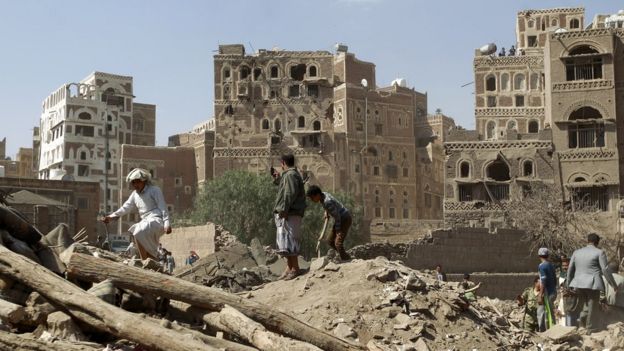Usually when we think of Saudi Arabia, we think of a nation sitting on tons of oil. When we hear about Saudi Arabia in the news, usually it is about some conflict in the Middle East, or its rivalry with Iran. What many of us may not know is its involvement in Yemen. Yemen, already the Arab region’s poorest nation, has been relying on the US and neighbors for aid. The nation is draining its oil supply, and it is no help that the former president Ali Abdullah Saleh embezzled billions of dollars. After Saleh was abdicated, a civil war broke out between the Houthi rebels and government loyalists. It seemed that the rebels were winning as they made dramatic pushes in the end of 2014. However, Saudi Arabia led a coalition to destroy the Houthis.
The Houthis are backed by Iran, which is Saudi Arabia’s sworn enemy, so it is understandable why Saudi Arabia would want to involve itself in such a war. The Saudis obviously would not want
its enemy create a new government right on the border.
its enemy create a new government right on the border.
A political council has been formed in the south where the people want a South Yemen, but there seems to be no way for any legitimate government to form, as the former government has exhausted its resources. The country is in anarchy with no foreseeable end. Both sides are committing atrocities and war crimes, so it is hard to justify any one side as the “right side”.
Yemen has a population of 27 million and suffers from famine and other disease outbreaks. With no stable government, Yemen is, according to the UN, going to collapse. In fact, the largest humanitarian crisis in the world is in Yemen.
It is difficult for Saudi Arabia to pull out because retreat means a defeat, and it means that the Saudi-led coalition has failed. It also means that terrorist organizations like Al-Qaeda, based in Yemen, will continue to thrive.
With more than 10,000 already dead and 40,000 more injured, it comes as no surprise that Saudi Arabia wants out. Instead of fighting, Saudi Arabia can help negotiate peace between the different sides because continuous violence will lead to no end. It becomes a vicious cycle where no side wants to compromise - look at Syria. Saudi Arabia may not want to strike a deal with its sworn enemy, but it seems to be the only viable option in this conflict that was doomed from the start. Prince Saud al-Faisal, the foreign minister of Saudi Arabia, promises that the offensive would continue until Yemen “returned to security, stability, and unity.” Even if Saudi Arabia is to continue fighting, its current strategy of sending airstrikes will not work.
Even if Saudi Arabia were to win this war and to support a new government, this new government would not be stable and would still be under constant attack. It is extremely likely that war would break out again once Saudi Arabia left. It would be difficult to completely wipe out influence from other terrorist organizations like ISIS, which has made some claims in Yemen already.
Though the war is meant to secure Saudi Arabia’s position as a central power among Arab states and to prevent an enemy-supported government right at its south border, Saudi Arabia must seriously reconsider its current strategy. Saudi Arabia is at a disadvantage and should make resolute efforts to broker peace. The deaths will only continue to rise, and the destruction will only grow.


cool. I like this. Keep up the Middle East articles!!!
ReplyDelete